Sievers Eduard. Grammar of Old English
Подождите немного. Документ загружается.

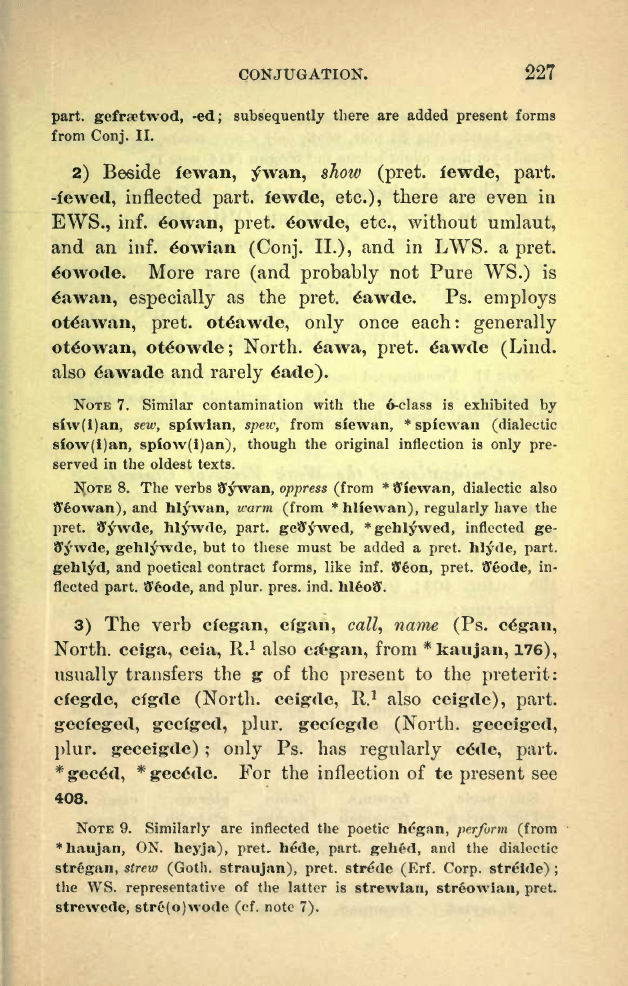
CONJUGATION.
227
part,
gefraetwod,
-ed;
subsequently
there are added
present
forms
from
Conj.
II.
2)
Beside
fewan, ^wan,
show
(pret.
fewde,
part.
-fewed,
inflected
part,
fewde, etc.),
there are
even
in
EWS.,
inf.
owan,
pret.
e"owde, etc.,
without
umlaut,
and an inf. 6owian
(Conj.
II.),
and in
LWS. a
pret.
owode.
More rare
(and
probably
not
Pure
WS.)
is
6awan,
especially
as the
pret.
6awde.
Ps.
employs
ote"awan,
pret.
ot^awde,
only
once
each:
generally
ot^owan,
ot6owde
;
North.
awa,
pret.
awde
(Lind.
also
6awade and
rarely
e"ade).
NOTE
7.
Similar contamination
with the
6-class
is
exhibited
by
siw(i)an,
sew, spiwian,
spew,
from
siewun,
*
spicwan
(dialectic
siow(i)an, spiow(i)an),
though
the
original
inflection is
only
pre-
served
in the oldest texts.
NOTE
8.
The verbs
ffywan,
oppress
(from
*
tfiewan,
dialectic also
ffowan),
and
hlywan,
warm
(from *hliewan),
regularly
have the
pret. ffyvvde,
hlywde,
part.
geftywed,
*gehlywed,
inflected
ge-
ffywde, gehlywde,
but to these must be
added
a
pret.
hlyde, part.
gehlyd,
and
poetical
contract
forms,
like
inf.
ffeon,
pret.
ffeode,
in-
flected
part,
ffeode,
and
plur.
pres.
ind.
h!6off.
3)
The verb
cfegan, cfgan,
call,
name
(Ps.
North,
ceiga,
ceia,
R.
1
also
cjfegan,
from
*kaujan,
176),
usually
transfers the
g
of
the
present
to
the
preterit:
cfegde,
cfgde
(North, ceigde,
R.
1
also
ceigde),
part.
gecfeged,
gecfged,
plur.
geciegde
(North, geceiged,
plur.
geceigde)
;
only
Ps. has
regularly
c6de,
part.
*
gec^d,
*
gec^de.
For
the inflection
of te
present
see
408.
NOTE 9.
Similarly
are inflected
the
poetic began,
perform (from
*haujan,
ON.
heyja),
pret.
hede,
part,
gehed,
and
the dialectic
strfcgan,
strew
(Goth, straujan),
pret.
strede
(Erf.
Corp.
streide)
;
the WS.
representative
of
the
latter
is
strewiau,
streowiaii,
pret.
strewede,
stre(o)vvode
(cf.
note
7).
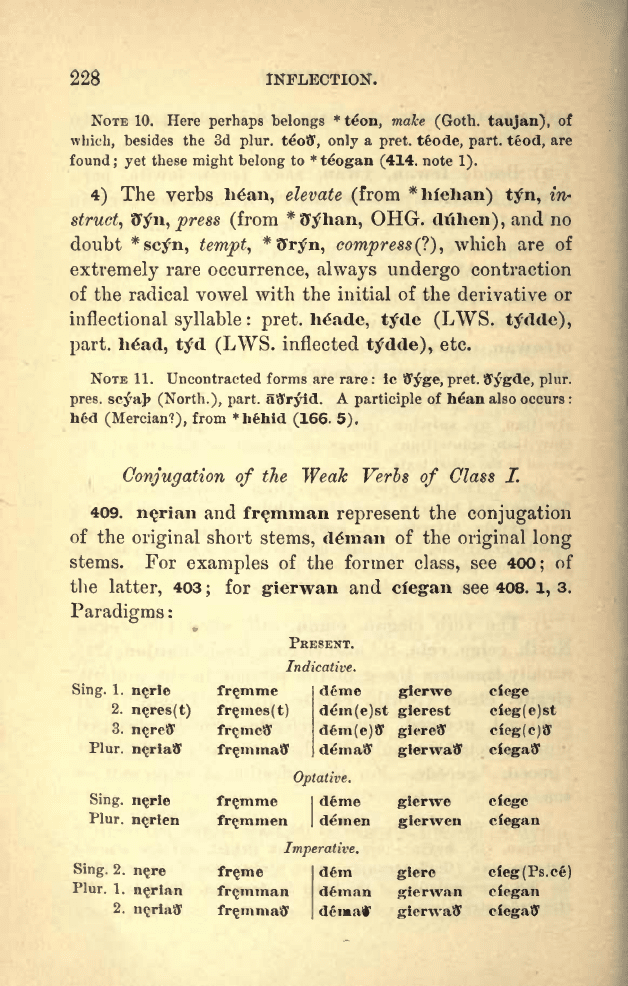
228
INFLECTION.
NOTE
10. Here
perhaps
belongs
*ton,
make
(Goth, taujan),
of
which,
besides the 3d
plur.
te'off,
only
a
pret.
t6ode,
part,
teod,
are
found
;
yet
these
might belong
to
*
tcogan
(414.
note
1).
4)
The
verbs
h6an,
elevate
(from *hfehan)
t^n,
in-
struct, 3tyn,
press
(from
*2tyhan,
OHG.
diihen),
and
no
doubt
*sc^n,
tempt,
*arr^n,
compress
(?),
which
are
of
extremely
rare
occurrence,
always
undergo
contraction
of
the
radical vowel with the
initial of
the derivative
or
inflectional
syllable
:
pret.
h^ade,
t^de
(LWS.
t^'dde),
part,
lu'-ad,
t^d
(LWS.
inflected
ttfdde),
etc.
NOTE 11. Uncontracted forms are rare : ic
ffyge, pret. ffygde, plur.
pres. scya>
(North.),
part. agFryid.
A
participle
of
lu'-an
also occurs
:
hfed
(Mercian?),
from *hfehid
(166.
5).
Conjugation
of
the
Weak
Verbs
of
Class I.
409. iirrian
and
fr^mman
represent
the
conjugation
of
the
original
short
stems,
dman of the
original
long
stems. For
examples
of
the
former
class,
see
400;
of
the
latter,
403
;
for
gierwan
and
cfegaii
see
408.
1,
3.
Paradigms
:
PRESENT.
Indicative.
Sing.
1. iH'i-ie
fre_mme
2.
iKM-t-sf
()
fre_mes(t)
3.
n(,-rc,Y
fre.me<V
Plur.
nej-iatf
frejnmaff
detne
glor\ve
dem(e)st
gierest
d6m(e)ff
glereff
demaff
gierwaff
Optative.
Sing,
n^rle
Plur.
frejnme gler\ve
deinen
gier\ven
Sing.
2.
Plur.
1. nor i
MII
2.
ii
i-i,, A
Imperative.
frejne
frriiiinan
glere
(Ionian
gierwan
gier-\va8f
ciege
ciegan
cieg(Ps.c6)
ciegan
eiegaff
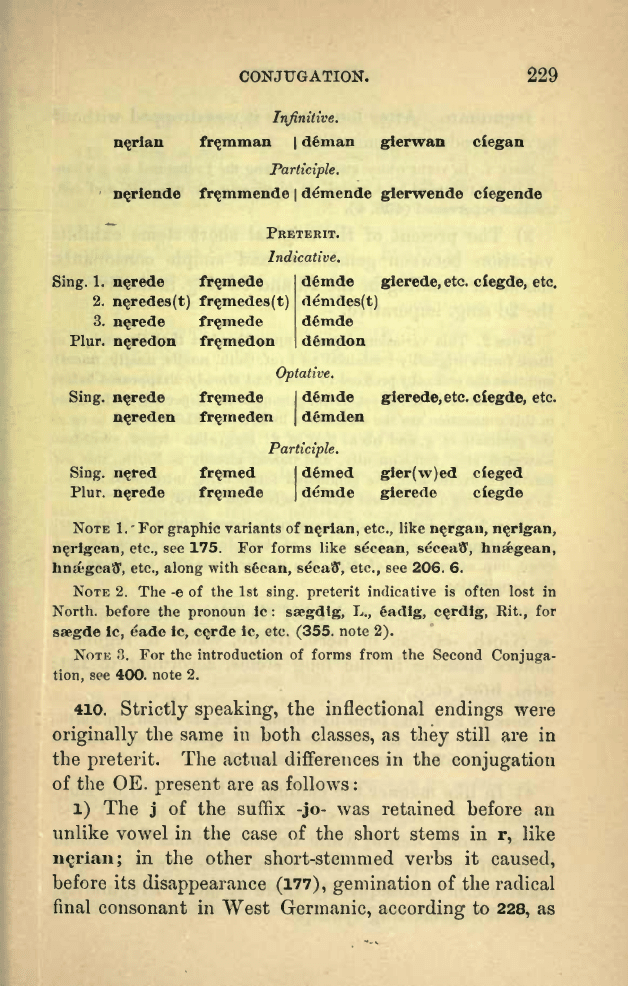
CONJUGATION. 229
Infinitive.
nerian
fremman
|
dman
gicrvvan
ciogan
Participle.
nerlende
fre,mmende
|
demende
gierwende cfegende
PRETERIT.
Indicative.
Sing.
1.
ne^rede
frejnede
2.
n^redes(t) fr^medes(t)
3.
n^rede
Plur. neredon
Sing,
ne.rede
u^reden
Sing,
nered
Plur.
n^rede
frejnede
f'rtMiicdoii
dmde
gierede,
etc.
ciegde,
etc.
demdes(t)
d6mde
dt'-iiidon
frejnede
fr^meden
Optative.
dt'-mde
demden
gierede,
etc.
ciegde,
etc.
Participle.
framed
fre^mede
deinde
gler(\v)ed
gierede
cieged
ciegde
NOTE
1.
'
For
graphic
variants of
n^rlan,
etc.,
like
n^rgan,
nejrigan,
n^rlgean,
etc.,
see 175. For forms like
secean,
seceaff,
hnaegean,
hneegeaff,
etc.,
along
with
sfecan, secaff, etc.,
see 206.
6.
NOTE
2. The -e
of the 1st
sing, preterit
indicative is often lost in
North, before
the
pronoun
Ic :
saegdlg,
L.,
6adlg,
ce_rdlg,
Kit.,
for
saegde
Ic,
eade
Ic,
c^rde
Ic,
etc.
(355.
note
2).
NOTE
3.
For
the introduction
of
forms
from
the Second
Conjuga-
tion,
see
400.
note 2.
410.
Strictly speaking,
the inflectional
endings
were
originally
the same
in
both
classes,
as
they
still
are
in
the
preterit.
The actual differences
in
the
conjugation
of the OE.
present
are as follows
:
1)
The
j
of
the suffix
-jo-
was retained before an
unlike vowel
in
the case
of
the short
stems
in
r,
like
ii^rian;
in
the
other
short-stemmed verbs
it
caused,
before its
disappearance (177),
gemination
of
the radical
final
consonant in
West
Germanic,
according
to
228,
as

230
INFLECTION.
iii
fr^mman.
After
long
stems
it was
dropped
without
having
produced gemination.
NOTE 1. In verbs whose stems were
long
the
j
remained as
g
when-
ever
it was
preceded by
a
vowel,
as
in
ciegan,
or was
lost,
and
con-
traction
supervened
(408. 4).
2)
The
present
of the
original
short stems exhibits
variation
between
geminated
and
simple
consonants,
the latter
standing
in the
2d and 3d
sing,
indicative
and
the
2d
sing,
imperative.
NOTE 2. This variation
depends
upon
the fact that the
ending
of
these
forms
originally
contained
an
i
(cf.
Goth,
nasjis, nasji]>, nasei),
and
that the suffixal
j prefixed
to
this
i
had
already disappeared
before
the occurrence
of the West
Germ,
gemination.
Especially
to be noted
in this
connection are the statements
in
190
and
216,
relating
to
eg
as
the
geminate
of
g,
and
bb
as
that of
f
:
I^cg(e)an-l^ge8",
sw^bban
-
swe_feff,
etc.
Subsequently,
and indeed
already
in
North.,
this
dis-
tinction is
overlooked,
the
geminated
forms
being
introduced
into the
2d and 3d
sing.
:
selest
and
sexiest,
seleff
and
s^lleff,
etc.
NOTE 3. The
inflection of
oogaii
in Ps.
depends upon
a similar vari-
ation:
cfegu,
cest, cfeff,
imperative
c6,
but
plur.
pres.
ind.
cegaff,
opt.
cege,
imp.
cfegaff,
etc.
(cf.
408.
3)
;
that
is,
j
vanishes
before an
1 of
the
termination.
3)
The
imperative
sing,
of the short stems ends
in
-e
(Goth,
-ei),
as
in
ne.re,
fr^me,
while
it
regularly
suffers
apocope
in
the
long
stems,
according
to
133
:
dm,
lifer,
etc.
NOTE
4. In
LWS.,
forms
like
d6me,
h#re,
are
found
;
in
North.,
on
the
other
hand,
the short
stems
suffer
apocope
:
ner,
se^l (cf.
372.
note).
LWS. even
has
te.lle,
but
cw?U.
4)
In
like
manner the
endings
of the
2d and 3d
sing,
indicative are
regularly
shortened to
-st,
&
in
the
EWS.
texts :
de'mst,
ctemfr,
while the short stems
but seldom
admit
of
syncope
(and
then
usually
after
1 and
g: sejar,
legrff,
etc.).
Subsequently
there is much
irregularity,
Pure
WS.
preferring
syncope.
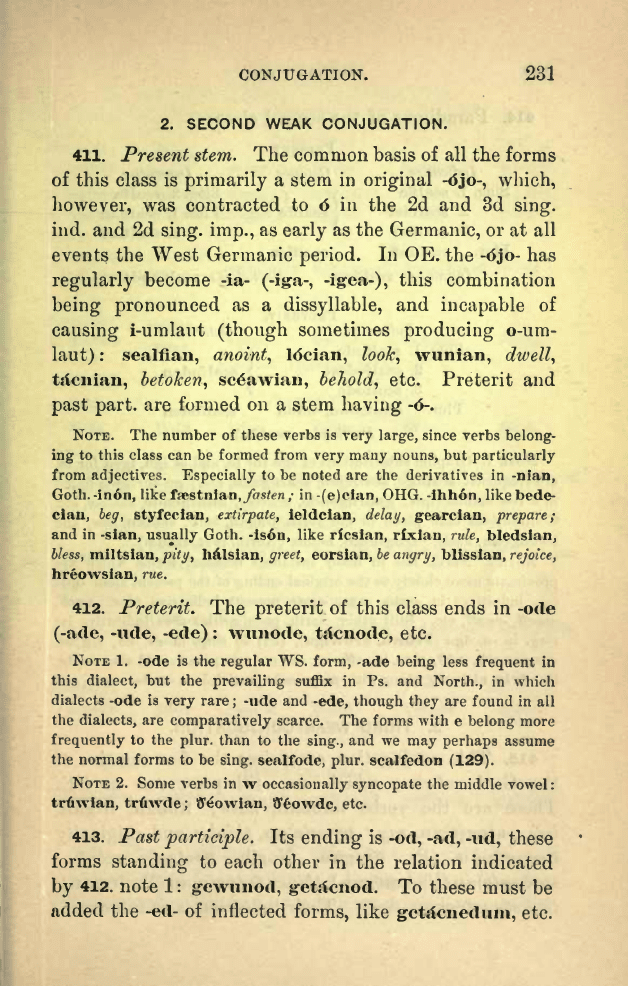
CONJUGATION.
231
2. SECOND
WEAK CONJUGATION.
411.
Present
stem.
The
common
basis
of all
the
forms
of this
class is
primarily
a
stem
in
original
-tfjo-,
which,
however,
was contracted
to 6
in
the
2d and 3d
sing.
ind. and 2d
sing, imp.,
as
early
as the
Germanic,
or at all
events the West Germanic
period.
In
OE.
the
-<5jo-
has
regularly
become
-ia-
(-iga-,
-igea-),
this combination
being
pronounced
as
a
dissyllable,
and
incapable
of
causing
i-umlaut
(though
sometimes
producing
o-um-
laut)
:
sealfian, anoint,
Itician,
look, wunian, dwell,
tacnian,
betoken, sc^awian, behold,
etc. Preterit and
past part,
are formed
on a stem
having
-6-.
NOTE. The number of these verbs
is
very large,
since verbs
belong-
ing
to this class can be formed from
very many
nouns,
but
particularly
from
adjectives.
Especially
to
be noted are the derivatives in
iiian,
Goth,
-iiion,
like
fcestnian,
fasten
;
in
-(e)cian,
OHG.
-ihhon,
like
bede-
ciaii,
beg,
styfecian,
extirpate,
ieldcian,
delay,
gearcian,
prepare;
and in
-sian,
usually
Goth,
-isoii,
like
ricslan, rixian,
rule, bledsian,
bless,
milt
sian,
pity,
halsiau,
greet,
eorsian,
be
angry,
bllssian,
rejoice,
hreowsian,
rue.
412.
Preterit.
The
preterit
of
this class
ends
in -ode
(-ade,
-ude,
-ede)
:
wuiiode,
t&cnode,
etc.
NOTE
1.
-ode
is
the
regular
WS.
form,
-ade
being
less
frequent
in
this
dialect,
but
the
prevailing
suffix in Ps. and
North.,
in
which
dialects
-ode
is
very
rare
;
-ude
and
-ede,
though they
are found in all
the
dialects,
are
comparatively
scarce. The
forms
with
e
belong
more
frequently
to the
plur.
than to
the
sing.,
and
we
may perhaps
assume
the normal
forms to
be
sing,
sealfode,
plur.
sealfedon
(129).
NOTE
2.
Some
verbs
in
w
occasionally
syncopate
the middle
vowel :
tr6wian,
trtiwde
;
ffeowian, ffeowde,
etc.
413.
Past
participle.
Its
ending
is
-od,
-ad,
-ud,
these
forms
standing
to
each
other in the
relation
indicated
by
412.
note
1 :
gewunod, getdcnod.
To
these must
be
added the
-ed-
of
inflected
forms,
like
getacnedum,
etc.

232
INFLECTION.
414.
Paradigms
of the second class
:
PRESENT.
Indicative.
Optative. Imperative.
Sing.
1.
sealfle \
Sing.
2. sealfa
2.
sealfast
[
sealfle Plur. I.
sou Mian
3.
sealfaff
>
2. sealfiaff
Plur.
sealfiaS
1
sealfien
Infinitive:
sealfian
Participle:
sealfiende
PRETERIT.
Indicative.
Optative.
Sing.
I.
seal
f
ode \
2. sealfodest > sealfoden
3.
sealfode
Plur.
sealfedon,
-odon
sealfoden
Participle
: sealfad
NOTE 1.
Graphic
substitutions of
Ige
for
le,
and
of
iga,
igea
for
la,
are
frequent
:
sealfige, sealfigen,
sealfigean,
etc.
;
ge
for
ie
is found
in a few
manuscripts
:
gnorngende,
grieving,
huntgende,
hunting,
etc.
Contractions take
place
in
the verbs
b6gan,
boast,
scoian, shoe,
and
tweogean,
doubt,
*te"og(e)an,
ordain
(North,
pret. tiadae).
NOTE
2.
North,
has in
many
instances
retained
forms which
ap-
proximate
more
closely
to the
original ending
of the
present
stem
-6jo
:
e.g.,
infinitives in
-ogla, -age, -egej present
indicative
plur.
-ageff,
-egeff, -egaff,
etc.
Still
other
North,
peculiarities
are: indicative
1st
sing,
in
-a,
-iga
(<5r6wa,
ffr6wiga),
(2d)
3d
sing,
in
-es, -eff,
-I(g)as,
-iges, -aglff,
-alff,
plur.
in
-aff,
-as,
-es,
etc.
;
imperative
2d
sing,
in
-ig,
like
arlg, cliunsig,
along
with
-a;
present
participle
in
-ende, -ande,
etc.
3.
THIRD WEAK
CONJUGATION.
415.
This
conjugation comprises
the few remains
of
the
Goth,
ai-class
which
are still
preserved
in OE.
These
are
the
verbs
ImtVban,
have;
libban,
lifgan,
live;
s$cg(e)an,
say
;
hycg(e)an,
think;
and
originally
<yr6ag(e)an (Ps.
ffr^gaii,
North,
ffreiga),
rebuke;
smag(e)an
(Ps.
sm^gan),
think;
frog(e)an
(Ps.frlgan),
liberate;
f^ogan,
hate.
Their
inflection
is as
follows:
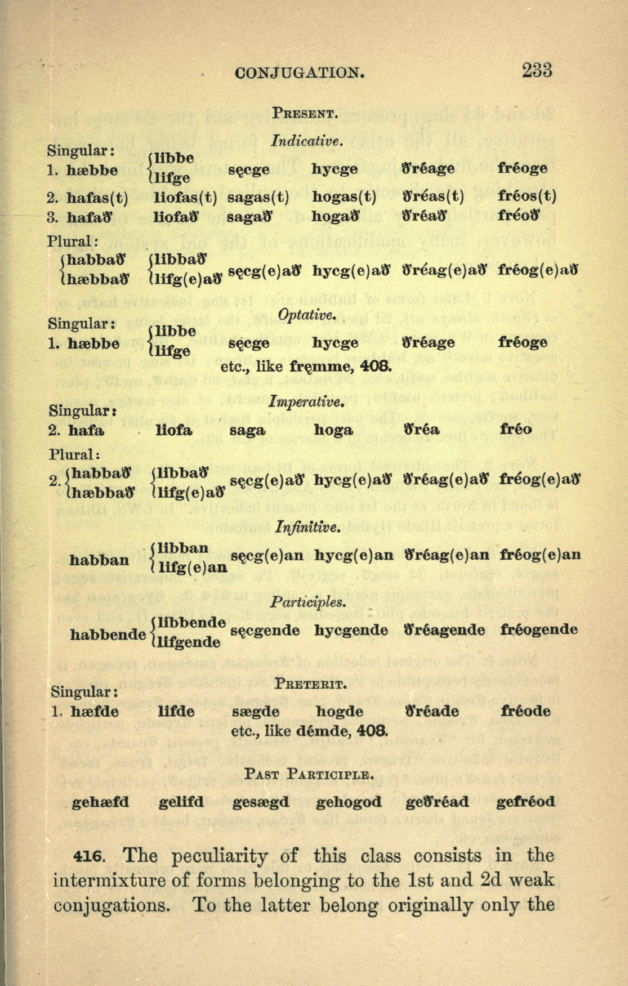
CONJUGATION.
233
PRESENT.
Indicative.
llf e
secge
hycge
2.
hafas(t)
liofas(t)
sagas(t) hogas(t)
ffreas(t)
freos(t)
Singular:
llblje
1. htebbe
3. hafaff
Plural
:
Singular:
1.
hicbbo
Singular:
2. liafa
Plural:
habban
Singular:
1,
haefde
liofaff
sagaff
hogaff
ffreage
ffreas(
ffrfeaff
freoge
freos(
fre"off
ffreag(e)aff fr6og(e)a
Optative.
hycge
ffrfeage
etc.,
like
fr^mme,
408.
llofa
saga
lioga
9rea
frfeoge
fr6o
*
(lifg(e)ao
Infinitive.
lifgende
llfde
freog(e)an
Participles.
hycgende
ffreagende
freogende
frfeode
PRETERIT.
saegde
hogde
ffreade
etc.,
like
deinde,
408.
PAST
PARTICIPLE.
gehaefd
gelifd
gesaegd gehogod geffread
gefreod
416.
The
peculiarity
of
this
class consists
in the
intermixture
of
forms
belonging
to
the
1st
and
2d weak
conjugations.
To
the latter
belong originally
only
the
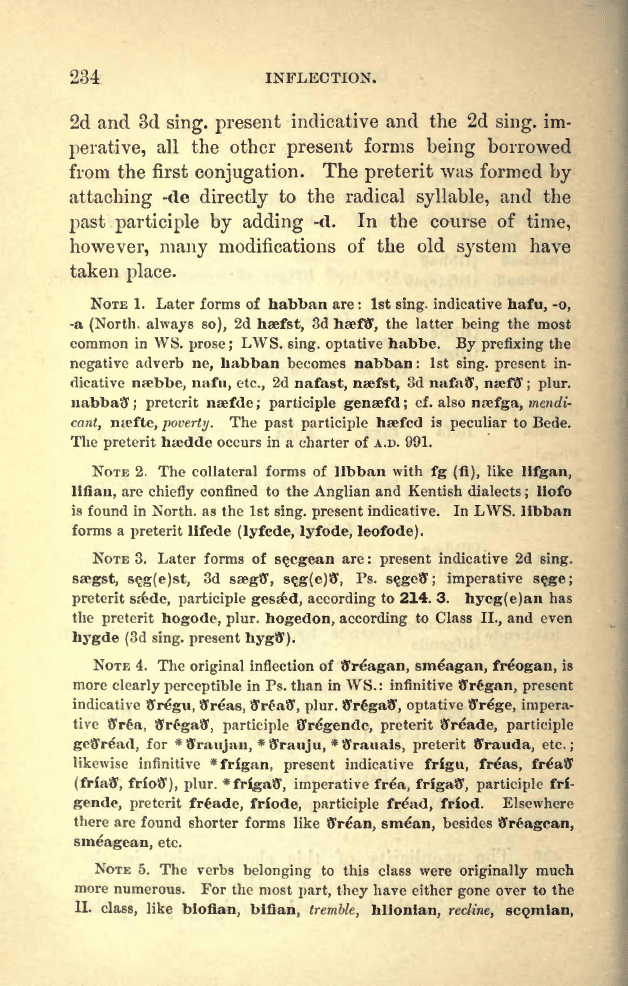
234
INFLECTION.
2d and
3d
sing,
present
indicative
and
the
2d
sing,
im-
perative,
all the other
present
forms
being
borrowed
from
the
first
conjugation.
The
preterit
was
formed
by
attaching
-de
directly
to
the radical
syllable,
and
the
past participle by adding
-d. In
the course
of
time,
however,
many
modifications
of
the
old
system
have
taken
place.
NOTE
1.
Later
forms of habban
are
: 1st
sing,
indicative
hafu,
-o,
-a
(North,
always
so),
2d
hacfst,
3d
haefff,
the
latter
being
the most
common
in
WS.
prose;
LWS.
sing, optative
habbe.
By prefixing
the
negative
adverb
ne,
habban
becomes
nabban
: 1st
sing,
present
in-
dicative
naebbe, nafu, etc.,
2d
nafast,
naefst,
3d
nala
<V. naefQ
1
;
plur.
nabbaff;
preterit
naefde;
participle
gensefd;
cf.
also
naefga,
mendi-
cant, naefte,
poverty.
The
past participle
haefed
is
peculiar
to
Bede.
The
preterit
haedde
occurs in
a charter of
A.D. 991.
NOTE 2. The collateral forms of libban
with
fg
(fl),
like
lifgan,
I i
lian,
are
chiefly
confined to the
Anglian
and
Kentish dialects
;
liofo
is
found in
North, as the 1st
sing, present
indicative.
In
LWS. libban
forms a
preterit
llfede
(lyfede,
lyfode,
leofode).
NOTE
3. Later forms of
se^cgean
are :
present
indicative
2d
sing,
saegst,
s^g(e)st,
3d
ssegff,
sej5(e)ff,
Ps.
s^geff;
imperative sej*e;
preterit
safede,
participle gesafed, according
to 214. 3.
hycg(e)an
has
the
preterit
hogode,
plur.
hogedon,
according
to Class
II.,
and even
hygde
(3d sing,
present
hygff).
NOTE 4.
The
original
inflection
of
ffr^agan,
smeagan, freogan,
is
more
clearly
perceptible
in
Ps. than in
WS.:
infinitive
ffregan,
present
indicative
ffregu,
ffr^as, ffreaff,
plur.
ffrfcgaff, optative
ffr^ge,
impera-
tive
ffrea,
ffrga8f,
participle
ffregende, preterit
ffr^ade,
participle
geff
read,
for
*
ffraujan,
*
ffrauju,
*
ffrauals,
preterit
ffrauda,
etc.
;
likewise
infinitive
*frigan,
present
indicative
frigu,
freas,
fr^aS
(friaff,
frioff), plur. *fr$gaff,
imperative
frea,
frigaff,
participle
fri-
gende,
preterit frade,
friode,
participle
fread,
friod.
Elsewhere
there
are found
shorter forms
like
ffrean,
smuan,
besides
8fr6agean,
snieagean,
etc.
NOTE 5.
The verbs
belonging
to this class
were
originally
much
more
numerous.
For the
most
part,
they
have
either
gone
over
to
the
II.
class,
like
biofian,
blflan,
tremble, hlioiiian,
recline,
scomian.
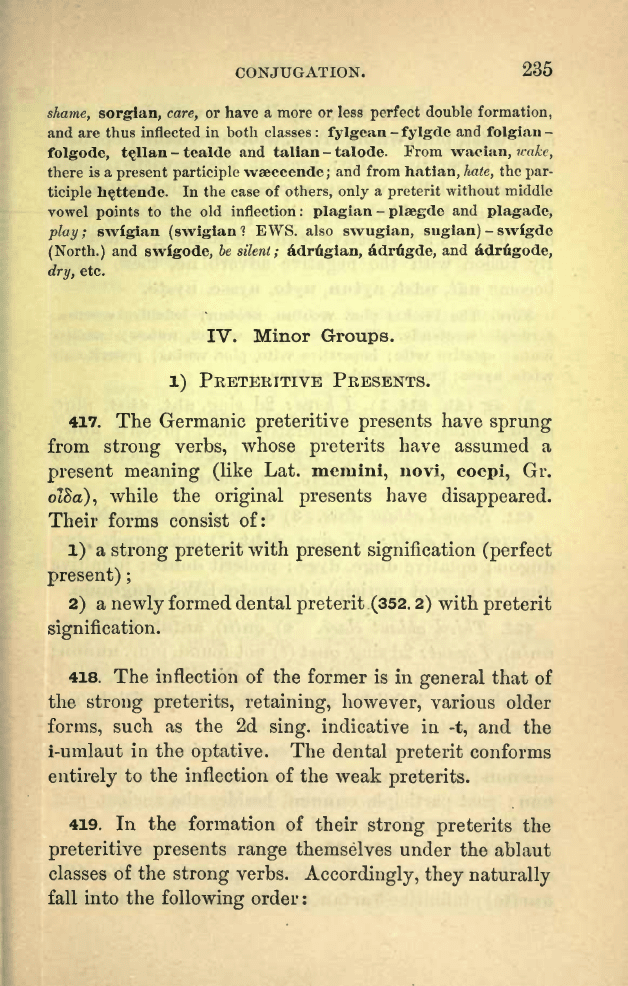
CONJUGATION.
235
shame, sorgian, care,
or have
a more or less
perfect
double
formation,
and are thus inflected
in both classes:
fylgean
-
fylgde
and
folglan-
folgode,
te^llan
-
tealde
and talian
-
talode. From
wacian,
u-akc,
there is a
present participle
waeccende;
and from
hatian, hate,
the
par-
ticiple h^ttende.
In the case
of
others,
only
a
preterit
without middle
vowel
points
to the old inflection
:
plagian
-
plaegde
and
plagade,
play;
swigian
(swigian?
EWS.
also
swugian, sugian)
-
swfgde
(North.)
and
swigode,
be
silent; adrugiau,
adrtigde,
and
adrtigode,
dry,
etc.
IV.
Minor
Groups.
1)
PRETERITIVE PRESENTS.
417.
The Germanic
preteritive
presents
have
sprung
from
strong
verbs,
whose
preterits
have assumed a
present meaning
(like
Lat.
meinini,
novi, coepi,
Gr.
oZSa),
while
the
original
presents
have
disappeared.
Their
forms consist
of:
1)
a
strong
preterit
with
present
signification (perfect
present)
;
2)
a
newly
formed dental
preterit
(352.
2)
with
preterit
signification.
418.
The inflection of the
former is in
general
that of
the
strong
preterits,
retaining,
however,
various
older
forms,
such as the
2d
sing,
indicative
in
-t,
and
the
i-umlaut in the
optative.
The
dental
preterit
conforms
entirely
to the inflection of
the weak
preterits.
419.
In
the formation of
their
strong preterits
the
preteritive
presents
range
themselves under
the ablaut
classes
of the
strong
verbs.
Accordingly,
they
naturally
fall into
the
following
order :
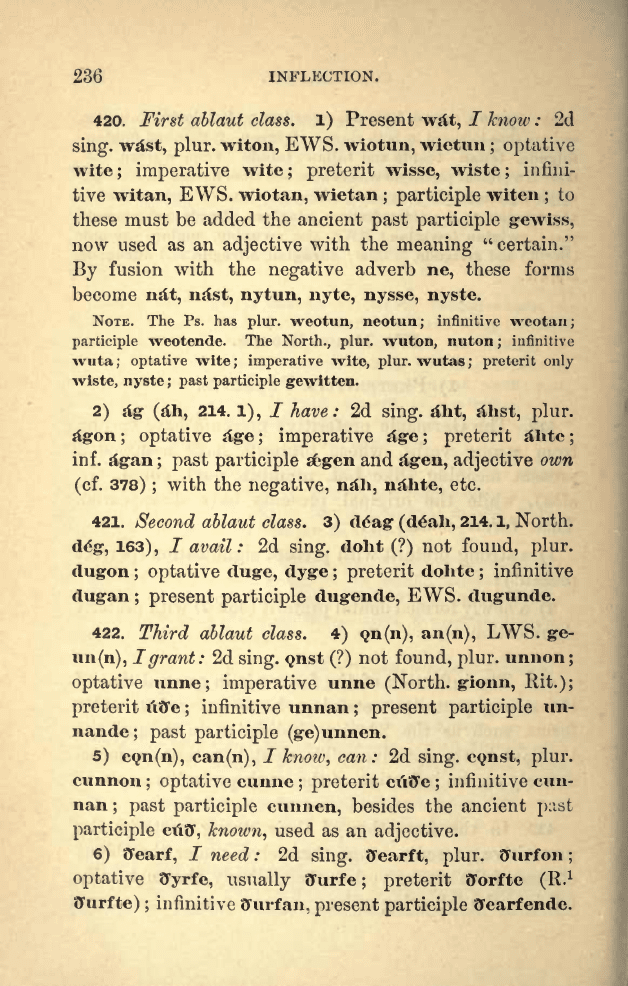
236
INFLECTION.
420. First ablaut
class,
i)
Present
wat,
/
know
:
2d
sing,
wast,
plur.
witon,
EWS.
wiotun,
wietun
;
optative
wite;
imperative
"write;
preterit
wisse,
\viste;
infini-
tive
witan,
EWS.
wiotan, wietan;
participle
witen
;
to
these
must be added the ancient
past
participle
gewiss,
now
used
as an
adjective
with the
meaning
"
certain."
By
fusion
with
the
negative
adverb
ne,
these
forms
become
ndt,
nast,
nytun, nyte, nysse,
nyste.
NOTE.
The
Ps. has
plur.
weotun,
neotun
;
infinitive
weotan
;
participle
weotende.
The
North.,
plur.
wuton,
union
;
infinitive
wuta
;
optative
wite
;
imperative wite,
plur.
wutas
;
preterit only
wiste,
nyste
;
past
participle
gewitten.
2)
ag
(all,
214.
1),
I have: 2d
sing,
aht,
ahst,
plur.
agon
;
optative
age ;
imperative
age ;
preterit
ante
;
inf.
agan;
past
participle
segen
and
agen,
adjective
own
(cf.
378)
;
with
the
negative,
nah,
nahte,
etc.
421.
Second ablaut class.
3)
deag
(d6ah,
214.
1,
North.
deg,
163),
I avail: 2d
sing,
doht
(?)
not
found,
plur.
dugon
;
optative
duge,
dyge ;
preterit
dohte
;
infinitive
dugan ;
present
participle
dugende,
EWS.
dugunde.
422.
Third
ablaut class.
4)
on(n), an(n),
LWS.
ge-
un(n),
I
grant:
2d
sing.
onst
(?)
not
found,
plur.
unnon;
optative
unne;
imperative
unne
(North,
gionn,
Rit.);
preterit
tifre
;
infinitive
unnan
;
present
participle
un-
nande;
past
participle
(ge)unnen.
5)
con(n),
can(n),
J
know,
can: 2d
sing,
const,
plur.
cunnon;
optative
cunne
;
preterit
ctio*e
;
infinitive
cun-
nan
;
past
participle
cunnen,
besides the
ancient
p:ist
participle
cuty,
known,
used as an
adjective.
6)
arearf,
/
need
:
2d
sing,
ffearft,
plur.
ffurfon
;
optative
ffyrfe,
usually
ffurfe
;
preterit
frorfte
(R.
1
ffurfte)
;
infinitive
ffurfan,
present
participle
arearf
ende.
